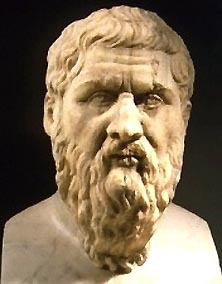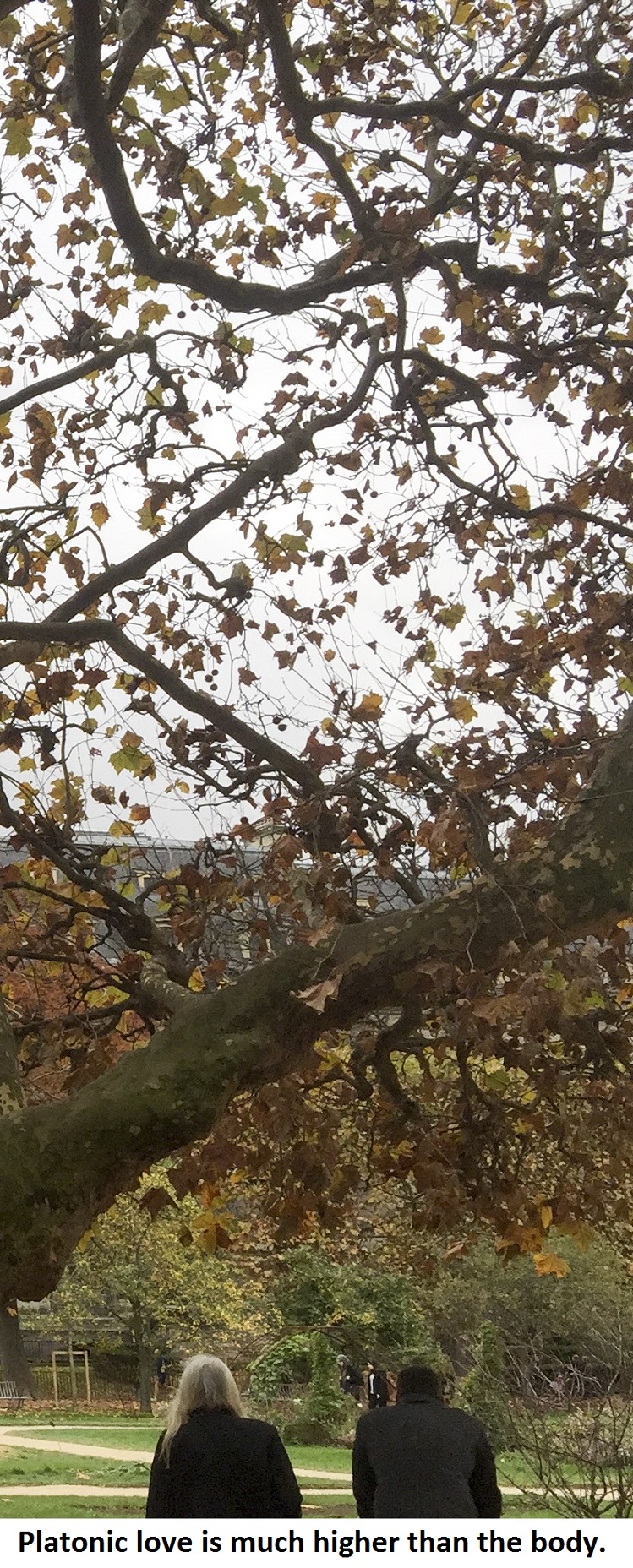LIST OF PHILOSOPHERS
Plato was one of the main philosophers of Western thought. He grew up in Athens, and was a student of Socrates. He founded the Greek academy, which continued to operate until the 6th century AD (when the Roman emperor closed it)...
On Love
Plato (about 428-348 BC)
 Plato (about 428-348 BC) was one of the main philosophers of Western thought. He grew up in Athens, and was a student of Socrates. He founded the Greek academy, which continued to operate until the 6th century AD (when the Roman emperor closed it). Among his students was Aristotle. Later in his life, Plato attempted to apply his philosophical ideas to the kingdom of Syracuse, with little success. Most of Plato’s books survived to this day, unlike many writings of the ancient world. He often wrote them in the form of a dialogue, usually putting his ideas in the mouth of Socrates.
Plato (about 428-348 BC) was one of the main philosophers of Western thought. He grew up in Athens, and was a student of Socrates. He founded the Greek academy, which continued to operate until the 6th century AD (when the Roman emperor closed it). Among his students was Aristotle. Later in his life, Plato attempted to apply his philosophical ideas to the kingdom of Syracuse, with little success. Most of Plato’s books survived to this day, unlike many writings of the ancient world. He often wrote them in the form of a dialogue, usually putting his ideas in the mouth of Socrates.
The following passage is slightly adapted from Plato’s text “The Symposium,” which deals with the nature of love. Plato describes here a drinking party, in which each man has to give a speech in praise of Eros (love). Socrates is one of the participants, and he too gives a speech. The ideas are obviously Plato’s ideas, and Socrates’ name is used only as a literary device.
In his speech, “Socrates” explains that the essence of love is yearning for perfect and eternal beauty. In contrast, popular forms of love – love for men or women, for gold, etc. – are lower levels of love, directed at lower forms of beauty. In the passage below, Socrates tells us what he had learned from the wise woman Diotima about the journey to this higher form of love.
 A person who wants to progress on this path of love must begin from early age to devote himself to the beauty of the body. First of all, if his instructor instructs him appropriately, he will fall in love with the beauty of one individual body, and his passion will give birth to noble thoughts.
A person who wants to progress on this path of love must begin from early age to devote himself to the beauty of the body. First of all, if his instructor instructs him appropriately, he will fall in love with the beauty of one individual body, and his passion will give birth to noble thoughts.
Next, he will realize that the beauty of one body is closely related to the beauty of every other body, and he will understand that if he wants to devote himself to the pursuit of bodily beauty, it would be absurd to deny that the beauty of every single body is the same beauty. And when he perceives this, he will quiet down his passionate love towards one body, which he will now regard as having little importance, and he will become a lover of every lovely body.
In the next stage, he will realize that the beauty of the soul is much higher than the beauty of the body. And so, if he meets somebody with a lovely soul, even in an unlovely body, he will be content to fall in love with him and admire him, and he will be motivated to find and express thoughts which may build in him a noble character.
 And this will bring him to the beauty of institutions and laws. And when he understands that the beauty of all of them is of the same family, he will conclude that the beauty of the body is not very important.
And this will bring him to the beauty of institutions and laws. And when he understands that the beauty of all of them is of the same family, he will conclude that the beauty of the body is not very important.
And next, his attention will turn from laws and institutions to the sciences, so that he may see their beauty. He will no longer be in love with the beauty of one person or one thing, like a narrow-minded slave, but he will turn towards the vast sea of beauty. In this contemplation, he will give birth to many beautiful and noble thoughts in boundless love of wisdom, until, after he grows strong, he has a revelation of a single form of knowledge, which is the knowledge of beauty everywhere.
Now I will continue, she said. Please pay your fullest attention.
 A person who has been instructed so far on the topic of love, and who has learned to see the stages of beauty in the right order, will suddenly perceive a wondrous beauty. This is, Socrates, the final goal of all our efforts. It is a kind of beauty which is, first of all, everlasting, not growing and decaying, not coming and disappearing. Second, it is not nice from one perspective and ugly from another, or nice at one time or in one place and ugly at another time or place. […] This beauty is absolute, separate, whole, and eternal, without increase or decrease, and without change. It is the source of the beauty of all the beautiful things.
A person who has been instructed so far on the topic of love, and who has learned to see the stages of beauty in the right order, will suddenly perceive a wondrous beauty. This is, Socrates, the final goal of all our efforts. It is a kind of beauty which is, first of all, everlasting, not growing and decaying, not coming and disappearing. Second, it is not nice from one perspective and ugly from another, or nice at one time or in one place and ugly at another time or place. […] This beauty is absolute, separate, whole, and eternal, without increase or decrease, and without change. It is the source of the beauty of all the beautiful things.
A person who has ascended these steps, under the influence of true love […] arrives at the understanding of absolute beauty, and at last he knows what the essence of beauty is. This, my dear Socrates," said the stranger of Mantineia, "is the highest form of life which a person can possibly live, in the contemplation of absolute beauty. If you see this beauty only once, you would no longer be interested in any gold and clothes and pretty boys and young men, those that now fascinate you so much.
Philosophers
-
- Plato
When you subscribe to the blog, we will send you an e-mail when there are new updates on the site so you wouldn't miss them.
